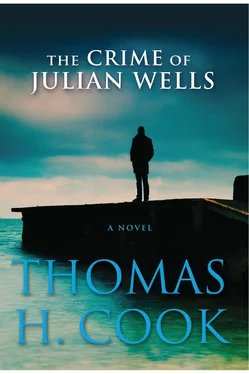Thomas Cook - The Crime of Julian Wells
Здесь есть возможность читать онлайн «Thomas Cook - The Crime of Julian Wells» весь текст электронной книги совершенно бесплатно (целиком полную версию без сокращений). В некоторых случаях можно слушать аудио, скачать через торрент в формате fb2 и присутствует краткое содержание. Год выпуска: 2012, ISBN: 2012, Издательство: Grove Press, Жанр: Криминальный детектив, на английском языке. Описание произведения, (предисловие) а так же отзывы посетителей доступны на портале библиотеки ЛибКат.
- Название:The Crime of Julian Wells
- Автор:
- Издательство:Grove Press
- Жанр:
- Год:2012
- ISBN:9780802194589
- Рейтинг книги:5 / 5. Голосов: 1
-
Избранное:Добавить в избранное
- Отзывы:
-
Ваша оценка:
- 100
- 1
- 2
- 3
- 4
- 5
The Crime of Julian Wells: краткое содержание, описание и аннотация
Предлагаем к чтению аннотацию, описание, краткое содержание или предисловие (зависит от того, что написал сам автор книги «The Crime of Julian Wells»). Если вы не нашли необходимую информацию о книге — напишите в комментариях, мы постараемся отыскать её.
The Crime of Julian Wells — читать онлайн бесплатно полную книгу (весь текст) целиком
Ниже представлен текст книги, разбитый по страницам. Система сохранения места последней прочитанной страницы, позволяет с удобством читать онлайн бесплатно книгу «The Crime of Julian Wells», без необходимости каждый раз заново искать на чём Вы остановились. Поставьте закладку, и сможете в любой момент перейти на страницу, на которой закончили чтение.
Интервал:
Закладка:
“It was like places in those spy books he was reading,” Rene told me when I mentioned this to him the next morning over breakfast. “There was still the Cold War in those days, and this bar, it was maybe a little like Vienna in that movie.” He began to hum the theme of The Third Man. “And now you are maybe a little like the American in that movie, no?” he asked with a short laugh. “Searching for your dead friend?”
I’d never thought of myself as a character in a film, especially one written by Graham Greene, and yet, I had to admit that I did feel a little like Martins in The Third Man . I wasn’t a penniless pulp writer, as he’d been, and I didn’t expect to meet a mysterious woman in a cemetery, but, as a man who’d lived a relatively safe life, experienced only the most commonplace adventures, risked nothing except on the stock market, there was something in Martins’s steadily intensifying investigation of the mysterious Harry Lime that was not unlike my own.
But I could also feel Martins’s confidence that no matter what he discovered about Harry Lime, it would do nothing to undermine his love or admiration for him. Anna Schmidt had assured him of exactly that in one of the movie’s most quoted lines: “A person doesn’t change just because you find out more.” I felt no doubt that it would be the same with Julian, for it seemed to me at the time that the goodness of a man was like a vein of gold that only widens as it deepens, then dazzles at the core.
My walk through Oradour had only increased my confidence in his essential goodness because it was here that Julian had made innocents the focus of his art by giving them voice, while at the same time, in a single, extraordinary artistic choice, he had denied any voice to their tormenters, so that while the villagers had emerged as individuals, the Germans had all but disappeared.
Disappeared.
Strange how that word brought Marisol back into my mind, she whose disappearance had so disturbed Julian, his search for her one of his life’s distinct failures, a dark end to his Argentine adventure that could not have been predicted by its bright beginning.
And it had been very bright, indeed, that beginning. We were often together, the three of us a faintly Jules and Jim trio of young people, though it was never a love triangle.
But though Julian was not in love with Marisol in that fiercely romantic way, he had certainly searched for her as if she’d been a lost lover, journeying all the way to the Chaco to see the priest who’d raised her.
He was in his midsixties, this priest, but he looked much older. His hair was gray, his face deeply lined, so that upon first impression he seemed to be as weathered as the destitute parish in which he’d labored all his life.
“He was already old when my aunt brought me to him,” Marisol said as we made our way to meet him that afternoon. “But he took in this little girl he did not know.”
She was dressed less stylishly than usual and had added a small white flower to her hair, a touch of the indigene that you never saw in worldly Buenos Aires. A nod to the priest, I supposed, proof that her heart-or at least part of it-remained with him in the Chaco.
The old priest was sitting alone on a bench as we approached him. He did not see us but continued to stare straight ahead while he fingered a wooden rosary.
“It is Father Rodrigo who sent me to Buenos Aires,” Marisol said, her gaze more intently on Julian than on me. “He is the saint of the Chaco.”
He was now only a few feet away, and it seemed to me that he was older than the color of his hair or the texture of his skin suggested. There was a spiritual quality to his agedness, a sense that he was as old as his faith, a witness to that first crucifixion.
We were almost upon him before he caught Marisol in his eye and struggled to his feet.
“Ah, my sweet daughter,” he said as he drew her into his arms.
She kissed him on both cheeks, then turned and introduced us.
The priest shook Julian’s hand first, then turned to me.
“I have heard of your father,” he said. He stretched his hand toward me and I took it. “He is said to be a good American. A friend. Hermano en la lucha .”
“I don’t know what that means,” I confessed.
“A brother in the struggle,” Marisol informed me.
Brother in the struggle?
I couldn’t imagine what Father Rodrigo was talking about.
“He is a man of the people, your father,” Rodrigo added. “This is what I have heard. He is known as our friend in your capital. The poor do not have many friends there.”
He had been gently pumping my hand during all this, and only now released it. “So, how do you know my Marisol?”
Though the question had been addressed to me, it was Julian who answered it.
“By way of the American consulate,” he said.
Father Rodrigo’s expression soured as he turned toward Julian. “They are working with the bad men of this country,” he said firmly, then looked at Marisol. “Be careful what you say, my child. It is known that they are spies.”
Spies. The word clearly caught Julian’s attention.
“Really?” he asked. “Spies for whom?”
“For Casa Rosada,” Rodrigo answered. “They give them names. Then these people disappear.” He looked at Marisol and placed a single, jagged finger at his lips. “Careful,” he said, then glanced toward a nearby bench. “Come, let us sit down.”
Once seated, Father Rodrigo took a moment to observe his surroundings. “Ah, how beautiful is San Martin. I have not seen it since I was a boy.”
He meant Plaza San Martin, a lovely park in the heart of the city, where Marisol had earlier instructed us to meet her. It was close to Retiro Station, she said, and Father Rodrigo was scheduled to leave the city that evening. I’d had little interest in coming, but Julian had insisted. Clearly he had indicated to Marisol that he considered it important to meet this old priest.
At rest, Father Rodrigo seemed even older, but also he looked neglected. His clerical collar was slightly frayed and there were a few small tears in his cassock. This suggested that no help was being provided to him, no Gran Chaco equivalent to those formidable ladies of my boyhood parish, women who kept their priests tidy down to the neatly folded underwear.
My father had explained that South American clergy who subscribed to revolution theology were being punished by what he called “the powers that be,” but on Father Rodrigo such imposed deprivations had created an aura of saintliness. Here was the Church as it should be, I thought, not a thing clothed in robes and adorned by jewels and housed in splendid cathedrals, but a country priest in a worn cassock.
“So,” Father Rodrigo said, glancing first to Julian, then back to me, “has Marisol told you of the place where she grew up?”
She had, as a matter of fact, but for the next few minutes, we listened politely as Father Rodrigo detailed the sad life of the Chaco, the poverty and poor education, young lives doomed to nothing else. It was this doom that he’d wanted Marisol to escape. He’d seen her intelligence, her will, the fact that she would grasp whatever opportunity came her way.
“Which she has done,” he said proudly, then drew Marisol beneath his arm. “She is no longer a girl from the Chaco.”
Marisol plucked the small white flower from her hair and gave it to Rodrigo. “I will always be a girl from the Chaco,” she said.
By then, night had begun to fall over Plaza San Martin. Father Rodrigo struggled to his feet.
“I must go now,” he said. “The bus home leaves soon.”
Marisol tucked her hand beneath the old man’s arm. “I will go with you to the station,” she said.
Читать дальшеИнтервал:
Закладка:
Похожие книги на «The Crime of Julian Wells»
Представляем Вашему вниманию похожие книги на «The Crime of Julian Wells» списком для выбора. Мы отобрали схожую по названию и смыслу литературу в надежде предоставить читателям больше вариантов отыскать новые, интересные, ещё непрочитанные произведения.
Обсуждение, отзывы о книге «The Crime of Julian Wells» и просто собственные мнения читателей. Оставьте ваши комментарии, напишите, что Вы думаете о произведении, его смысле или главных героях. Укажите что конкретно понравилось, а что нет, и почему Вы так считаете.












